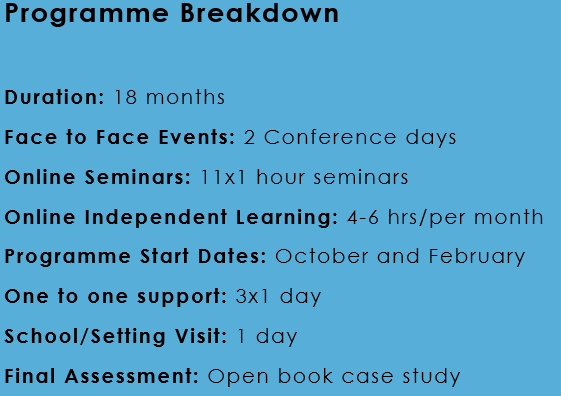Executive Leadership (NPQEL)
This programme will help you to:
-
Develop as a leader with trust-level responsibility
-
Access content across a breadth of areas, such as organisational management, working in partnership, and additional and special educational needs and disabilities.
-
Effectively implement change and improvement in an area you identify as a trust priority
Who's it for?
Leaders who are, or are aspiring to be, an executive headteacher or have a school trust CEO role with responsibility for leading several schools.
Find out more about this programme and apply below:
NPQEYL Benefits
Gain a prestigious qualification to take your career to the next level
Get the tools you need to establish and sustain your trust’s strategic direction and culture.
Develop specialist expertise in running a multi-school organisation
Learn how to develop processes and systems that enable and encourage collaboration between staff within and across your schools. You’ll gain practical skills in effectively managing resources and establishing sustainable policies.
Connect with and learn from other executive leaders in the field
Build and expand your network across the country. Gain valuable fresh perspectives from other leaders in similar roles.
Free one-to-one support and coaching
If you work in a school serving disadvantaged communities, you can apply for our free one-to-one support which runs alongside the NPQ in Executive Leadership (NPQEL). You’ll be supported by an experienced former school leader who will coach and guide you throughout the programme. You can apply for this additional support in your application.
Join a passionate network striving for educational equality
Share experiences with other school leaders, learn how they’ve faced similar challenges and build a professional network that will support you throughout your career.
The Programme
Is the NPQEL programme for me?
This is for school leaders who are, or are aspiring to be, an executive headteacher, or have a school trust Chief Executive Officer (CEO) role with responsibility for leading several schools.
How does the NPQEL work?
This 21-month programme (18 months’ delivery and up to three months for assessment) consists of a series of courses based on the DfE’s NPQ frameworks. Each course cycle features:
- evidence-based online content to refresh and build knowledge, as well as exemplify what this looks like for your role and level of leadership
- a formative assessment task to support your learning
- a face-to-face seminar with a group of peers, facilitated by a serving school leader or Teach First Development Lead – you’ll analyse and reflect on the task and hear further examples of good practice
- the opportunity to record reflections and consolidate learning
This cycle repeats throughout the programme, with implementation a consideration in every course. Towards the end of the programme, you’ll also take a course focused specifically on effective implementation. This provides an opportunity to complete a significant but manageable change project as part of your role. There will be ongoing support through a seminar group and discussion forum.
What will I learn?
You’ll develop expertise in the knowledge, skills and concepts for areas of trust-level responsibility related to your role. These include trust culture, working in partnership and organisational management. Our content is informed by the best and most recent evidence and developed with input from school leaders and subject matter experts.
Our programmes have a practical focus. You’ll be supported to make small but important changes to your and others’ practice throughout the programme. This will conclude with the implementation module and practical implementation cycle of the programme.
To find out more about DfE’s NPQEL content framework, you can download it below.
What are the training commitments?
The programme is designed to fit around your other school commitments. Over the course of the whole programme (spread over five terms), you’ll undertake 80 hours of learning, including 43 synchronous and 12 in-person. This includes a combination of seminars, learning modules, conferences and a practical learning cycle.
How will I be assessed?
At the end of the programme, you will complete your summative NPQ assessment during a fixed 8-day window. Your assessment submission is a written response to a case study related to the content covered in your NPQ, and is an opportunity to demonstrate your knowledge and understanding of the NPQ Framework. Detailed dates will be shared with you before the start of the programme.
In order to be eligible to complete the assessment, you will need to have engaged with at least 90% of the course content both online and in-person. Diagnostic tasks contribute 30%, reflective tasks 20%, and attendance at events 50% to this total.
The assessment process for all NPQs has been refreshed to reduce the workload burden on teachers while still providing an opportunity to apply their knowledge. To pass the programme, you’ll need to evidence at least 90% of the course and pass one summative assessment.
At the start of your training, we’ll also provide you with the dates of the Summative Assessment so you can plan for this with your school. The summative assessment will take the form of a case study. It will represent a likely situation that a leader might encounter at the relevant NPQ qualification level. The summative assessment is designed to give you an opportunity to demonstrate your understanding of the relevant NPQ framework and how this can be applied to school improvement.
You will have an eight-day window to provide a written response of a maximum of 1500 words for the case study. It is an ‘open book’ approach so you can refer back to your course materials when completing your response.
Cost
A limited number of DfE scholarship funded places will be available to teachers and leaders from:
- the 50% of schools with the highest proportion of students who attract pupil premium funding
- the 16 to 19 educational settings identified as having high disadvantage
Non-funded places: £3,890


